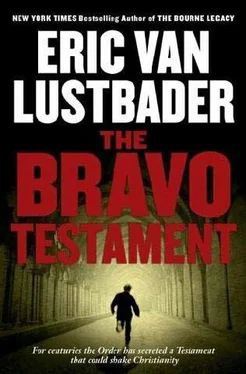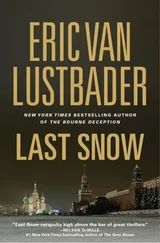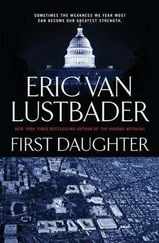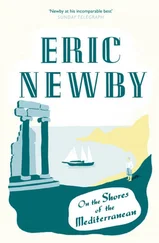Bravo bowed his head for a moment, trying to gather himself. Then he said, "What is to be done with the Testament?"
The old priest's gaze held steady. He had not blinked once, not even in this bright sunlight. "That is for you to decide."
"It is not for me alone to decide. I am asking for your advice."
The old priest stroked his beard for a moment. "You already understand the extreme danger of the Quintessence, you've felt it yourself. The Testament of Christ is just as dangerous. What it contains-the words of Jesus-has the power to upend all Christianity. Is this what you want?"
"But it's the truth."
"Ah, yes, the truth." The old priest took a step toward him. "During its long history the Order has continually struggled with the truth. How the debates raged back and forth within the Haute Cour! Now I must ask you what we asked ourselves: which will better promote the natural order of things, truth or perception? When you have answered that question, Bravo, you will know what to do with the Testament."
He began to walk up the street, in the direction of Sumela. "Wait," Bravo said. "Will I see you again?"
The old priest paused. "Oh, yes."
"What shall I call you, then. Surely not Fra-"
"That name is ancient, it has outlived its moment," the old priest said at once. "Call me, rather, by my Christian name, the name my father and mother gave me at birth. Call me Braventino."
AUTHOR'S NOTE
THE HISTORY BEHIND THE FICTION
Virtually all of the history in The Testament is real. The Franciscan Observatines are recorded in history, as are the Knights of St. John of Jerusalem, who inspired my own Knights of St. Clement of the Holy Land.
It seems inevitable that the Gnostic Observatines and the Knights would be at each other's throats. From as far back as the early 1300s, there was a deep division within the Franciscans regarding the strict vow of poverty demanded by St. Francis upon the founding of the Order in the beginning of the thirteenth century. The Observatines (also called Observantists) believed in it, the Conventuals did not. The dispute came to a head in 1322 when Pope John XXII sided with the Conventuals and their allies, the more established Dominican Order.
The pope's papal bull, Cum inter nonmullos, which said among other things that the rule of poverty was "erroneous and heretical," was likely a subterfuge. It seems far more plausible that the pope wanted to stamp out a faction of the Franciscans bent on roaming the world, spreading their gospel, their power and influence, rather than staying put in monasteries, as the Conventuals were bound to do. This is the real reason he ruled against the Observatines.
However, the ruling was hardly the end of the Observatines. Quite the opposite, in fact. In the latter part of the fifteenth century and the first two decades of the sixteenth century, a good number of Observatines who had accepted the papal bull were in the Middle East, especially Trebizond, ostensibly serving both as emissaries and proselytizers. It seems likely that they were also carrying on the business of the Observatines. It is here, at the place where East and West meet, that I have imagined my Gnostic Observatines discovering many of their secrets, including the fragment of the Testament of Jesus, and the Quintessence, which is also recorded in history as the fabled Fifth Element, sought after by every Alchemist on earth.
To conform to history as much as possible, I have set the official founding of the Gnostic Observatine Order more or less to this date, though certainly there were stirrings within the Observatines in the decade before 1322.
Gnosticism is, in and of itself, anathema to the Vatican and its staunchly traditionalist orders. Its name derives from the Greek word for "knowledge." Gnostics, to put it simply, believe that the physical world is corrupt, evil, that the way to salvation lies in adhering to the wholly spiritual path to goodness. Some even hold that Jesus was a purely spiritual being, so only appeared to die on the cross. Some gnostics also pursue studies in the so-called "esoteric mysteries," which the Church has judged to be magic, and so, heretical.
The Knights, champions of both Christ and the pope, would naturally be predisposed to despise and fear the Order, who took quite seriously St. Francis's edict to roam the world, spreading his gospel. It's entirely logical that the Knights would be only too happy to do the pope's bidding in dismantling the Order's power.
The Secret Gospel of Mark is recorded in history, as well. Sections of it are quoted in a letter attributed to the second-century church father Clement of Alexandria to Theodore. Clement claims that after Peter's death, Mark brought his original gospel to Alexandria and wrote a "more spiritual gospel" The letter was unearthed by the biblical scholar Morton Smith in 1958 in the Mar Saba monastery just south of Jerusalem. Not surprisingly, its authenticity is disputed by many biblical scholars, who do not believe that the historical Jesus was a miracle worker.
However, that is precisely how the Secret Gospel of Mark portrays him in this passage: "And they come into Bethany. And a certain woman whose brother had died was there. And, coming, she prostrated herself before Jesus and said to him, 'Son of David, have mercy on me.' But the disciples rebuked her. And Jesus, being angered, went off with her into the garden where the tomb was, and straightaway, going in where the youth was, he stretched forth his hand and raised him, seizing his hand."
Smith's subsequent study of the gospels led him to the following contention: that Jesus "could admit his followers to the kingdom of God, and he could do it in some special way, so that they were not there merely by anticipation, nor by virtue of belief and obedience, nor by some other figure of speech."
In any event, no matter one's personal beliefs, the possibilities Smith-and, indeed, history itself-have revealed remain fascinating, the stuff of endless speculation, the basis of fiction that continues to enthrall us all.











